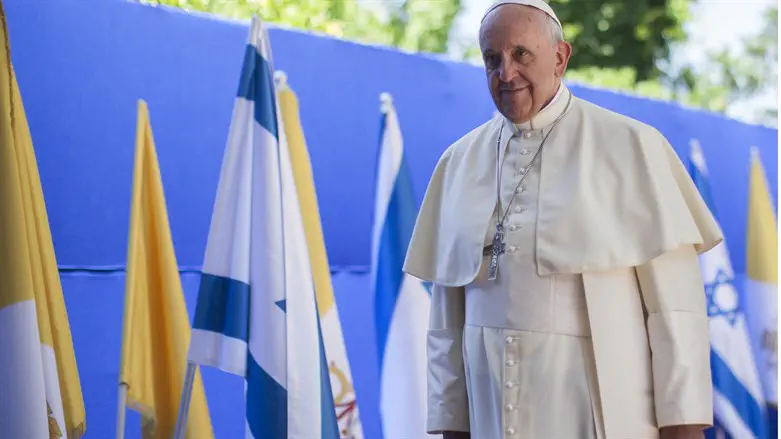
Pope Francis met with an interfaith delegation at the Vatican on Monday, which included representatives from Jewish, Muslim, Christian, Buddhist, and Druze communities.
According to Ynet, during the meeting, the Pope addressed remarks attributed to him in excerpts from an upcoming book, which suggested he had said, "Israel should be investigated for genocide in the Gaza Strip."
The Pope clarified that his words had been misunderstood, the report said, explaining, "I did not claim that Israel committed genocide. I was shown materials from the war, and I said that if this is true, then it needs to be investigated. I understand what is happening in Gaza. I think Hamas should no longer exist in the world, but the war should also not be prolonged."
One of the attendees, Rabbi Yosef Garmon—former Chief Rabbi of Guatemala and current head of "The Humanitarian Coalition," which focuses on humanitarian efforts in Latin America—addressed the Pope directly, according to Ynet.
Rabbi Garmon, a former tank commander in the 9026 Battalion, spoke from personal experience and told the Pope, "You cannot say that Israel must be investigated for genocide. Look at my fellow soldiers who died from our unit. They died because we entered Gaza only to search for the terrorists and to protect the innocent. Israel also protects the Palestinians and liberates them from Hamas. Any other country would bomb them from the air and eliminate this threat in one day.”
Rabbi Garmon also told the Pope, “Israel has the capability to end the war in one day and erase Gaza entirely, but it did not act that way and risked its soldiers to prevent the killing of innocents. You should investigate those who call to investigate Israel—not the other way around."
In response, Pope Francis reiterated that his statements had been taken out of context. He also highlighted the shared threat posed by radicalism across different faiths, adding that if extremism prevails, it endangers everyone.
The Pope mentioned that while Palestinian Arabs regularly send him materials regarding the conflict, Israel does not provide him with similar documentation or seek to draw attention to its perspective.
In November of last year, Jewish groups criticized Pope Francis after he appeared to accuse both Israel and Hamas of “terrorism” in the war that started after Hamas’ brutal attack on Israel on October 7.
“This is what wars do,” the pope said at his general audience in St. Peter’s Square. “But here we have gone beyond wars. This is not war. This is terrorism.”
Rabbi David Lau, then the Chief Rabbi of Israel, later wrote a letter to Pope Francis in which he called on the Pontiff to retract his comments.
In September, the Pope decried the deaths of children in Israeli military strikes in Gaza while expressing doubt that Israel and Hamas are seeking an end to the war between them.
The Pope also said that "sometimes I think it's a war that is too much, too much".
Despite his controversial comments during the war, Pope Francis recently met with a delegation of released Israeli hostages and their families, who are campaigning for the release of those still held captive.
He also recently expressed solidarity with the families of six hostages whose bodies were found in Gaza earlier this month, noting that he had met the mother of one of the victims.
"I think of the Middle East. So many innocent victims. I think of the mothers who have lost sons to war. How many young lives cut short," Pope Francis.
"I think of Hersh Goldberg-Polin, found dead in early September with five other hostages in Gaza. In November last year, I met his mother, Rachel, whose humanity struck me. I accompany her at this time. I pray for the victims and continue to be close to all the families of the hostages," he added.
"Let the conflict in Palestine and Israel cease. Let the violence cease. Let the hatred cease. Let the hostages be released. Let negotiations continue. And may solutions for peace be found," Pope Francis said.

